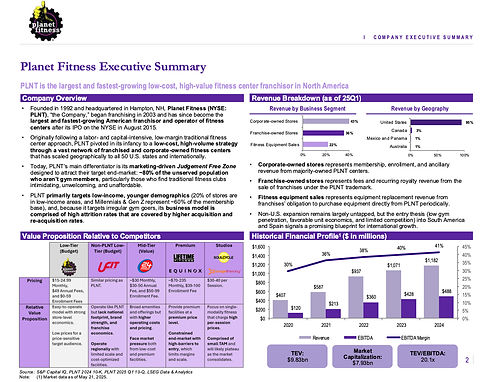Previous Research & Projects
Planet Fitness:
Activist Investor Strategy Project
In this in-depth strategic review of Planet Fitness (NYSE: PLNT), I worked as part of a six-member team to develop an activist investor-style presentation targeting operational, geographic, and digital growth opportunities. We analyzed Planet Fitness's financials, franchise model, and market position using primary filings and third-party datasets (S&P Capital IQ, LSEG, etc.). Our recommendations focused on optimizing international expansion, rethinking franchise contracts, pricing strategies, and modernizing PLNT’s digital fitness ecosystem to unlock shareholder value. I led the analysis of digital monetization and franchise-level pricing reform.
See the case presentation here:


2025 Startup: Pulse
Role: Co-Founder & Strategy Lead
Tools: Figma, Power BI, Excel, Vercel, Firebase
Pulse is a map-based discovery platform that helps college students find and promote events in real time.
I led product strategy and business modeling for the platform, designed to solve the visibility gap in campus arts, music, and student-led programming. We built a mobile-first interface with interactive maps and personalized event feeds to boost on-campus engagement. My work focused on financial planning, user experience design, and market differentiation — positioning Pulse as a lightweight, scalable alternative to cluttered event boards and social media posts.
Check out the beta version (MVP) of Pulse here:
Applying Game Theory to Understand Modern Tuition Pricing
This study applies evolutionary game theory to model the strategic interactions between universities and students in tuition pricing and financial aid decisions. By leveraging mathematical modeling, Nash equilibrium analysis, and computational simulations, the research explores how institutions balance revenue generation with accessibility, while students optimize their educational investment. The findings provide insights into the long-term dynamics of tuition pricing, student decision-making, and policy implications for higher education affordability. Link to full project.


Impacts of Climate Change on Microbial Biology
This research examines the effects of climate change on microbial ecosystems, focusing on shifts in microbial diversity, function, and ecosystem services. Using a combination of statistical modeling, metagenomic analysis, and climate data integration, the study highlights how rising temperatures, altered precipitation patterns, and environmental stressors reshape microbial communities. The findings contribute to a deeper understanding of microbial resilience and their role in global biogeochemical cycles, with implications for agriculture, human health, and ecosystem stability. Link to article.


